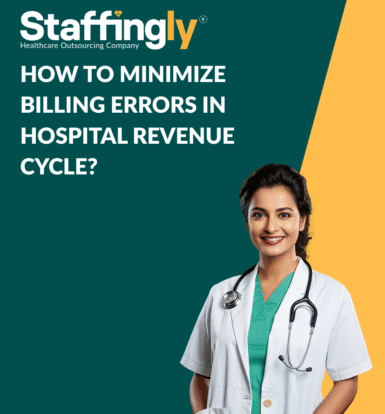On-Demand Outsourcing BPO Services for Healthcare Providers With 24/7 Coverage!
Save up to 70% on staffing costs!
Browse Specialty Staffing Services
Why Insurance Eligibility Verification Is the First Step to Healthy Revenue?
How Revenue Cycle Begins at the Front Desk? In healthcare, the revenue cycle starts well before the treatment of a patient it begins at the front desk with a critical step: Insurance Eligibility Verification. This early stage in the process can determine whether claims are paid or denied, directly affecting the bottom line. By confirming a patient’s insurance eligibility at the start of their visit, healthcare providers can avoid costly errors, streamline their billing process, and ensure that they are

Improving First-Pass Claim Acceptance Rate in Hospitals: A Comprehensive Approach
In the healthcare industry, managing claims efficiently is crucial for maintaining a steady revenue stream and ensuring smooth operations. The first-pass claim acceptance rate is a key performance indicator (KPI) that hospitals and healthcare organizations monitor closely. It refers to the percentage of insurance claims that are accepted by payers without requiring resubmission or correction. A high first-pass acceptance rate not only reduces administrative burdens but also accelerates the payment cycle, leading to improved cash flow and fewer delays in

Hospital RCM Challenges with Auto Insurance Claim Processing
Revenue Cycle Management (RCM) is a critical function for hospitals, directly impacting their financial stability and patient care capabilities. Auto insurance claims, often a part of workers’ compensation or personal injury cases, present a unique set of challenges within the RCM framework. Hospitals face a variety of obstacles in processing auto insurance claims, leading to delays in payment, increased administrative burdens, and sometimes, reduced revenue. In this article, we’ll explore the common challenges hospitals face with auto insurance claim processing

Improving Hospital Collections with Clear Patient Billing
Hospital collections have become an increasingly important aspect of the healthcare revenue cycle, especially as patient responsibility continues to rise due to high-deductible health plans and changes in insurance policies. Clear, transparent, and effective billing processes can significantly improve hospital collections by reducing confusion, ensuring timely payments, and minimizing bad debt. A well-structured patient billing system also builds trust, improves patient satisfaction, and leads to better financial outcomes for healthcare facilities. The Importance of Clear Patient Billing In an era

Specialty Claims Complications in Hospital Revenue Cycle
Managing the hospital revenue cycle has always been complex, but specialty claims add an extra layer of challenges. These claims often involve high-cost medications, complex therapies, and services requiring prior authorization and compliance with payer-specific rules. Failure to manage these intricacies effectively can lead to delayed reimbursements, claim denials, and financial strain for healthcare organizations. Understanding Specialty Claims Specialty claims typically involve treatments such as oncology, rheumatology, cardiology, transplant services, and specialty pharmacy medications. These treatments are often: High cost

Improving Hospital Billing Outcomes with Staff Education
Hospital billing is one of the most critical processes in healthcare operations. Accurate billing ensures hospitals maintain financial stability while patients experience transparency and fairness in charges. However, billing errors, denials, and compliance failures continue to strain healthcare organizations. A proven solution to improving billing outcomes is structured staff education programs. By equipping employees with the knowledge, tools, and skills needed to navigate billing complexities, hospitals can reduce financial leakage, enhance compliance, and improve patient trust. Why Staff Education Matters

Hospital Staff Training Programs for RCM Accuracy
Revenue Cycle Management (RCM) is the backbone of financial stability in hospitals. It ensures that services provided to patients are accurately documented, coded, billed, and reimbursed in compliance with regulations. Errors in RCM not only lead to revenue leakage but also increase the risk of audits, denials, and patient dissatisfaction. To strengthen accuracy, hospitals must invest in structured staff training programs tailored to the entire RCM workflow from patient registration through final payment posting. Importance of RCM Accuracy Accurate

How to Minimize Billing Errors in Hospital Revenue Cycle?
In the healthcare sector, billing errors pose a significant threat to hospital financial stability. Inaccurate billing can lead to claim denials, delayed reimbursements, and revenue loss, which ultimately affects the hospital’s cash flow and overall operational efficiency. Minimizing billing errors is a crucial step in optimizing the Revenue Cycle Management (RCM) process. This article explores the causes of billing errors in the hospital RCM and offers detailed strategies to minimize them. Common Causes of Billing Errors in Hospitals 1. Incorrect
 Book a Demo to Build Your Team Today!
Book a Demo to Build Your Team Today!


 Read Case Studies
Read Case Studies 



 Virtual Medical Assistants
Virtual Medical Assistants



